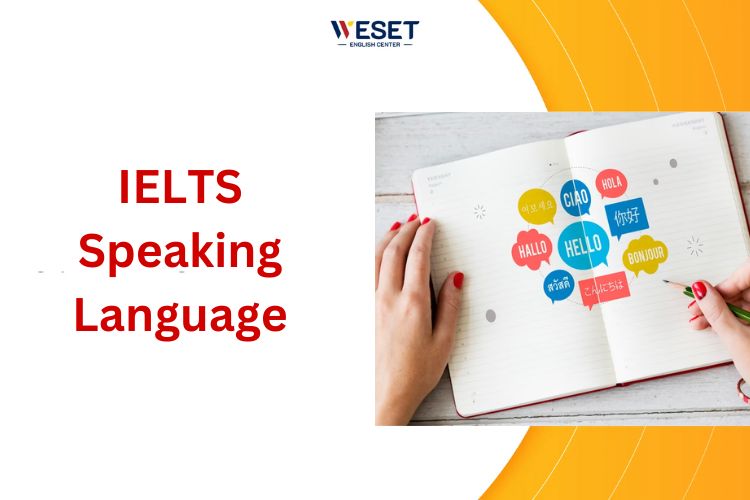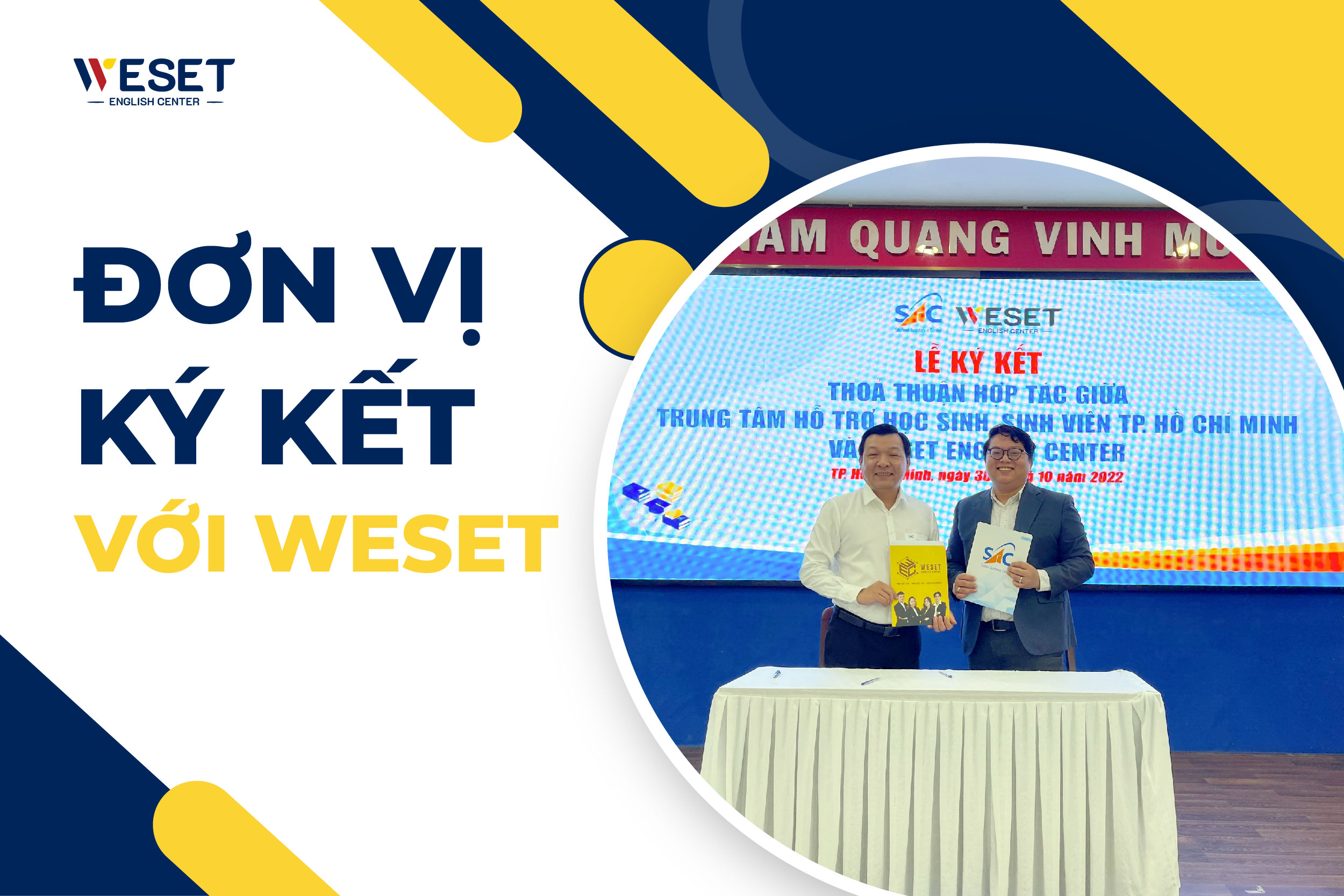Trang chủ Blog Bài thi IELTS mẫu IELTS Speaking Language – Bài mẫu Part 1, 2, 3 Sample
IELTS Speaking Language – Bài mẫu Part 1, 2, 3 Sample
- Jonathan M. Pham
- Bài mẫu IELTS Sample Speaking, Bài thi IELTS mẫu
MỤC LỤC
Cùng với quá trình hội nhập văn hóa, ngôn ngữ đã trở thành kỹ năng không thể thiếu – vì lý do này, không có gì ngạc nhiên khi nó cũng là một chủ đề Speaking IELTS thi thoảng xuất hiện. Sau các topic như liên quan như Travel hay Culture, hôm nay bạn đọc hãy cùng WESET trở lại với series bài mẫu qua chủ đề IELTS Speaking Language nhé!
IELTS Speaking Language – Sample Part 1
Do you speak any other languages besides English?
Answer: Yes, I’m fluent in Vietnamese & French. I had the opportunity to study Spanish extensively during my high school and college years. I find that being multilingual has opened up a lot of doors for me, both in terms of travel and career opportunities.
How did you learn English?
Answer: I began learning English at a young age, starting with basic classes in school. However, I believe my proficiency improved significantly through immersion – watching English movies, reading books, and interacting with native speakers. I also participated in language exchange programs which greatly enhanced my conversational skills.
Do you think learning a new language is important?
Answer: Yes, learning a new language offers numerous advantages. Firstly, it allows you to communicate with a broader range of people, enabling cultural exchange and fostering understanding. Secondly, it enhances cognitive abilities, such as problem-solving and multitasking. Finally, it can open up doors to better job opportunities and improved travel experiences.
Have you ever tried to teach someone a new language?
Answer: Yes, I have. I helped a friend learn some basic Spanish before her trip to Spain. We practiced conversational phrases and focused on key vocabulary. It was a rewarding experience to witness her confidence grow as she started using the language during her travels.
Do you think technology has made it easier to learn new languages?
Answer: Absolutely, technology has revolutionized language learning. With apps, online courses, and interactive platforms, learners can access a wealth of resources anytime, anywhere. These tools offer personalized learning experiences, catering to individual needs and pace. However, while technology can be immensely helpful, consistent practice and real-life interactions remain crucial for language proficiency.
Are there any languages you’d like to learn in the future?
Answer: Certainly, I’m intrigued by the idea of learning Portuguese. It’s not only a widely spoken language but also an integral part of a rich cultural heritage. However, I understand that it’s a challenging language to master, so I would need to dedicate substantial time and effort to achieve a meaningful level of proficiency.
IELTS Speaking Language – Sample Part 2
Describe a time when you had to use a foreign language to communicate with someone. You should mention:
- When and where it happened.
- Who you were communicating with.
- Why you needed to use a foreign language.
- How you felt about the experience.
Answer:
Certainly, I’d like to share an unforgettable experience where I found myself using a foreign language to communicate effectively. This incident took place during my solo trip to Japan last year, a journey filled with incredible cultural encounters and language challenges.
It was a beautiful sunny afternoon in the vibrant city of Kyoto, known for its stunning temples and traditional architecture. I had just finished exploring the awe-inspiring Kinkaku-ji Temple and was wandering through the nearby bustling streets. As I was navigating my way to a local eatery, I came across a small street market where a middle-aged Japanese woman was selling exquisite handmade crafts.
Intrigued by her intricate creations, I struck up a conversation with her. However, to my surprise, she spoke very little English, and my knowledge of Japanese was fairly limited. Determined to connect and learn more about her craft, I decided to muster the courage to communicate with her using the few Japanese phrases I had picked up before the trip.
With a friendly smile, I greeted her in Japanese and complimented her craftsmanship. Despite my nervousness, I managed to convey my admiration for her work and my desire to purchase a piece as a souvenir. To my delight, she responded with genuine warmth and started explaining the unique techniques involved in creating those beautiful crafts. Through a combination of broken Japanese, hand gestures, and the occasional use of a translation app on my phone, we engaged in a truly meaningful exchange.
The experience left me with a profound sense of accomplishment and a newfound appreciation for the power of language as a bridge between cultures. Despite the initial language barrier, our interaction transcended words, and we connected on a human level. This encounter reaffirmed my belief that genuine intentions and a willingness to communicate can overcome even the most daunting linguistic obstacles.
Overall, this experience enriched my travels, allowing me to delve deeper into the local culture and connect with individuals in a meaningful way. It highlighted the importance of learning foreign languages, not just for practical communication but also for the doors it opens to forming authentic connections with people from diverse backgrounds.
IELTS Speaking Language – Sample Part 3
How do you think globalization has affected the importance of learning different languages?
Answer: Globalization has significantly heightened the importance of learning different languages. In today’s interconnected world, people from diverse linguistic backgrounds collaborate on a daily basis, be it in business, academia, or cultural exchange. Proficiency in multiple languages not only facilitates effective communication but also fosters better understanding and cooperation among individuals and nations. Moreover, it enhances one’s adaptability and opens doors to a broader range of opportunities, both professionally and personally.
Do you think schools should focus more on teaching foreign languages from a young age? Why or why not?
Answer: Absolutely, I believe introducing foreign language education at a young age is highly beneficial. Young minds are more receptive to language acquisition, and early exposure to different languages can enhance cognitive development. Learning languages from a young age also promotes cultural sensitivity and empathy, as students gain insights into different ways of thinking and communicating. Furthermore, starting language learning early can lead to higher proficiency levels by the time students reach adulthood, allowing them to navigate an increasingly diverse and globalized world more effectively.
How has technology impacted the way we learn languages?
Answer: Technology has revolutionized language learning in numerous ways. Online platforms, language learning apps, and interactive software offer engaging and personalized learning experiences. Learners can practice pronunciation, expand vocabulary, and engage in real-life simulations, all from the comfort of their devices. Additionally, video conferencing and language exchange platforms enable direct communication with native speakers, enhancing speaking and listening skills. While technology has made learning languages more accessible and convenient, it’s important to balance digital resources with authentic interactions and practical usage for a well-rounded language acquisition process.
In what situations do you think being multilingual could be a disadvantage?
Answer: While being multilingual offers numerous advantages, there can be situations where it might pose challenges. In some cases, native speakers of a language may question the authenticity of a multilingual individual’s cultural identity or linguistic fluency. Additionally, in professions where precise and technical language use is crucial, being multilingual could occasionally lead to misunderstandings or inaccuracies. Moreover, the cognitive demands of maintaining proficiency in multiple languages could potentially lead to cognitive overload in certain high-pressure or fast-paced environments.
Is it more important to be fluent in a few languages or to have basic knowledge of many languages?
Answer: Both approaches have their merits, but it largely depends on one’s goals and context. For international business or diplomacy, fluency in a few languages might be more advantageous, as it allows for deeper and more meaningful communication. However, having basic knowledge of many languages can be valuable for travel, cultural appreciation, and casual interactions. Ultimately, the level of language proficiency should align with the individual’s needs and aspirations, while acknowledging that any effort put into learning and appreciating different languages is worthwhile.
Từ vựng IELTS Speaking Language Vocabulary
| English | Vietnamese (Tiếng Việt) |
|---|---|
| Bilingual | Song ngữ |
| Fluent | Lưu loát, thành thạo |
| Immersion | Tiếp xúc, ngâm cứu |
| Proficiency | Sự thành thạo, sự thành thạo vững vàng |
| Communication | Giao tiếp |
| Cultural exchange | Trao đổi văn hóa |
| Cognitive abilities | Khả năng nhận thức, nhận thức |
| Problem-solving | Giải quyết vấn đề |
| Multitasking | Đa nhiệm |
| Opportunities | Cơ hội |
| Travel experiences | Kinh nghiệm du lịch |
| Personalized learning | Học tập cá nhân hóa |
| Consistent practice | Luyện tập đều đặn |
| Real-life interactions | Giao tiếp trong cuộc sống thực |
| Revolutionized | Cách mạng hóa, biến đổi |
| Online courses | Khóa học trực tuyến |
| Interactive platforms | Nền tảng tương tác |
| Linguistic obstacles | Rào cản ngôn ngữ |
| Interconnected world | Thế giới liên kết |
| Profound | Sâu sắc, thâm thúy |
| Linguistic diversity | Đa dạng ngôn ngữ |
| Adaptability | Khả năng thích nghi |
| Cognitive development | Phát triển nhận thức |
| Cultural sensitivity | Nhạy bén với văn hóa |
| Empathy | Đồng cảm |
| Technical language use | Sử dụng ngôn ngữ kỹ thuật |
| Misunderstandings | Hiểu lầm |
| Inaccuracies | Sự không chính xác |
| Multilingual | Đa ngôn ngữ |
| Fluency | Sự lưu loát, sự thành thạo |
| Aspirations | Hoài bão |
Lời kết
Trên đây là một số câu hỏi & gợi ý trả lời cho phần thi IELTS Speaking Language. Hãy nhớ, thực hành thường xuyên là chìa khóa quan trọng nhất trong quá trình ôn luyện để chuẩn bị thi IELTS. Trong quá trình ôn tập, bạn đọc nhớ tham khảo thư viện bài mẫu Speaking Sample – cũng như đăng ký nhận tin và xem qua các khóa học IELTS theo lộ trình của WESET – để có hướng đi tốt nhất cho lộ trình học của bản thân nhé!
Bài mẫu Speaking theo chủ đề khác:







